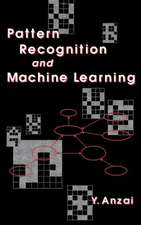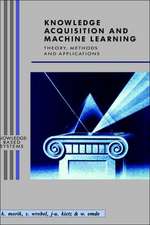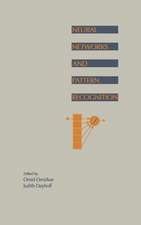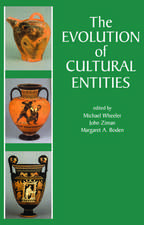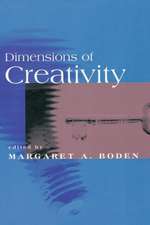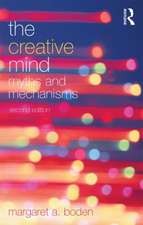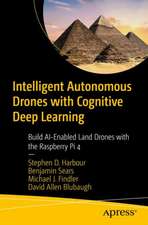Artificial Intelligence: Handbook of Perception and Cognition
Editat de Margaret A. Bodenen Limba Engleză Hardback – 19 iun 1996
- Up-to-date account of how computational ideas and techniques are relevant to psychology
- Includes discussions of "classical" (symbolic) AI, of connectionism (neural nets), of evolutionary programming, and of A-Life
- Discusses a wide range of psychology from low-level vision to creativity
| Toate formatele și edițiile | Preț | Express |
|---|---|---|
| Paperback (1) | 56.45 lei 4 zile | |
| OUP OXFORD – 23 aug 2018 | 56.45 lei 4 zile | |
| Hardback (1) | 1104.13 lei 6-8 săpt. | |
| ELSEVIER SCIENCE – 19 iun 1996 | 1104.13 lei 6-8 săpt. |
Preț: 1104.13 lei
Preț vechi: 1380.16 lei
-20% Nou
Puncte Express: 1656
Preț estimativ în valută:
211.27€ • 221.18$ • 174.82£
211.27€ • 221.18$ • 174.82£
Carte tipărită la comandă
Livrare economică 05-19 aprilie
Preluare comenzi: 021 569.72.76
Specificații
ISBN-13: 9780121619640
ISBN-10: 0121619648
Pagini: 376
Dimensiuni: 152 x 229 x 20 mm
Greutate: 0.68 kg
Ediția:00002
Editura: ELSEVIER SCIENCE
Seria Handbook of Perception and Cognition
ISBN-10: 0121619648
Pagini: 376
Dimensiuni: 152 x 229 x 20 mm
Greutate: 0.68 kg
Ediția:00002
Editura: ELSEVIER SCIENCE
Seria Handbook of Perception and Cognition
Public țintă
Advanced students, academics, and researchers in cognition, education, perception, artificial intelligence, computer science, and decision making.Cuprins
A. Clark, Philosophical Foundations.
R. Inder, Planning and Problem Solving.
D. Partridge, Representation of Knowledge.
S. Russell, Machine Learning.
H. Barrow, Connectionism and Neural Networks.
J. Fox, Expert Systems and Theories of Knowledge.
D.C. Hogg, Machine Vision.
M. Steedman, Natural Language Processing.
M.A. Boden, Creativity.
M. Sharples, Human-Computer Interaction.
J.-A. Meyer, Artificial Life and the Animate Approach to Artificial Intelligence.
Chapter References.
Index.
R. Inder, Planning and Problem Solving.
D. Partridge, Representation of Knowledge.
S. Russell, Machine Learning.
H. Barrow, Connectionism and Neural Networks.
J. Fox, Expert Systems and Theories of Knowledge.
D.C. Hogg, Machine Vision.
M. Steedman, Natural Language Processing.
M.A. Boden, Creativity.
M. Sharples, Human-Computer Interaction.
J.-A. Meyer, Artificial Life and the Animate Approach to Artificial Intelligence.
Chapter References.
Index.
Recenzii
"An interesting collection of chapters on various topics within artificial intelligence--planning and problem solving, knowledge representation, learning, connectionism, expert systems, machine vision, natural language systems, robotics, creativity, and human-computer interaction. Major theoretical approaches are outlined and fundamental philosophical questions are discussed. Recommended for graduate students, professional researchers, and faculty (psychologists, philosphers,or computer scientists) interested in the current state of the art in artificial intelligence." --C. TAPPERT, United States Military Academy
Descriere
Descriere de la o altă ediție sau format:
The applications of Artificial Intelligence lie all around us; in our homes, schools and offices, in our cinemas, in art galleries and - not least - on the Internet. The results of Artificial Intelligence have been invaluable to biologists, psychologists, and linguists in helping to understand the processes of memory, learning, and language from a fresh angle.As a concept, Artificial Intelligence has fuelled and sharpened the philosophical debates concerning the nature of the mind, intelligence, and the uniqueness of human beings. In this Very Short Introduction , Margaret A. Boden reviews the philosophical and technological challenges raised by Artificial Intelligence, considering whether programs could ever be really intelligent, creative or even conscious, and shows how the pursuit of Artificial Intelligence has helped us to appreciate how human and animal minds are possible.ABOUT THE SERIES: The Very Short Introductions series from Oxford University Press contains hundreds of titles in almost every subject area. These pocket-sized books are the perfect way to get ahead in a new subject quickly. Our expert authors combine facts, analysis, perspective, new ideas, and enthusiasm to make interesting and challenging topics highly readable.
The applications of Artificial Intelligence lie all around us; in our homes, schools and offices, in our cinemas, in art galleries and - not least - on the Internet. The results of Artificial Intelligence have been invaluable to biologists, psychologists, and linguists in helping to understand the processes of memory, learning, and language from a fresh angle.As a concept, Artificial Intelligence has fuelled and sharpened the philosophical debates concerning the nature of the mind, intelligence, and the uniqueness of human beings. In this Very Short Introduction , Margaret A. Boden reviews the philosophical and technological challenges raised by Artificial Intelligence, considering whether programs could ever be really intelligent, creative or even conscious, and shows how the pursuit of Artificial Intelligence has helped us to appreciate how human and animal minds are possible.ABOUT THE SERIES: The Very Short Introductions series from Oxford University Press contains hundreds of titles in almost every subject area. These pocket-sized books are the perfect way to get ahead in a new subject quickly. Our expert authors combine facts, analysis, perspective, new ideas, and enthusiasm to make interesting and challenging topics highly readable.
Notă biografică
Margaret Boden, OBE, is Research Professor of Cognitive Science at the University of Sussex, and one of the best known figures in the field of Artificial Intelligence. She has written extensively on the subject, most recently the two-volume work Mind as Machine: a history of cognitive science (2006). She has lectured widely, to both specialist and general audiences across the world, and has appeared on many radio and TV programmes, in the UK and elsewhere. She was awarded an OBE in 2001 for 'services to cognitive science.'







